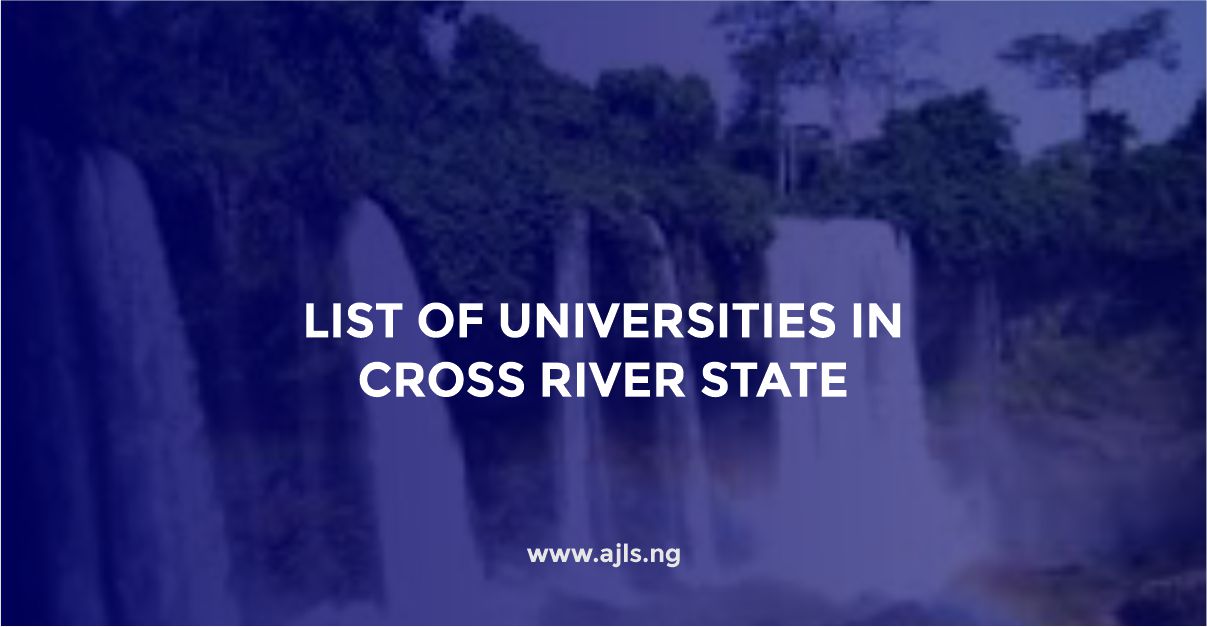Complete List of Universities in Cross River State

Are you a prospective student or a researcher searching for the list of Universities available in Cross River State? Cross River State is a state that houses four accredited universities that offer quality education in fields like science, arts, technology, and management. These institutions play a key role in academic growth, research, and the development of the region. Whether federal, state, or private, each university contributes to making Cross River a hub for learning and innovation.
The universities in Cross River State provide a wide range of programs to meet the needs of different students. From the well-known University of Calabar, which excels in research and innovation, to private institutions that focus on entrepreneurship and career development, these schools attract students from all over Nigeria and beyond. Below is an overview of the universities in Cross River State and their role in higher education.
List of Universities in Cross River State
Here are the names of the accredited universities in Cross River State. This list comprises both federal, state, and private universities established in Cross River State. These universities offer undergraduate and postgraduate programs with all their courses fully accredited by the National Universities Commission (NUC).
If you are a prospective student or a researcher seeking to know the names of universities that are available in Cross River State the information is right below.
University of Calabar (UNICAL)
Established in 1975, the University of Calabar (UNICAL) is one of Nigeria’s foremost federal universities. It evolved from a campus of the University of Nigeria, Nsukka, and has grown into a fully-fledged institution renowned for its academic excellence.
UNICAL offers a wide range of undergraduate, postgraduate, and professional courses across faculties such as Medicine, Law, Engineering, Agriculture, and Social Sciences. The university is also known for its vibrant student community, cutting-edge research, and commitment to producing graduates who contribute meaningfully to society.
Cross River University of Technology (CRUTECH)
The Cross River University of Technology (CRUTECH) was established in 2002 as a state-owned university aimed at fostering technological and scientific advancements.
The university operates multiple campuses in Calabar, Obubra, Ogoja, and Okuku, offering programs in Engineering, Environmental Sciences, Agriculture, Management, and Communication Technology. CRUTECH is dedicated to producing skilled professionals who drive innovation and development in Nigeria.
Arthur Jarvis University (AJU)
Arthur Jarvis University, established in 2016, is the first private university in Cross River State. Located in Akpabuyo, near Calabar, the university is recognized for its emphasis on quality education, entrepreneurship, and technological advancement.
AJU offers programs in fields such as Natural and Applied Sciences, Social Sciences, Humanities, and Management Studies. Its serene learning environment and modern teaching facilities make it a preferred choice for students seeking a private university education.
Evangel University, Akaeze (Proposed Campus in Cross River)
Although originally based in Ebonyi State, Evangel University has proposed the establishment of a campus in Cross River State to expand its reach and academic offerings.
As a faith-based institution affiliated with the Assemblies of God Church, the university emphasizes moral values, leadership development, and academic excellence.
Eligibility Criteria for Gaining Admission Into These Universities
Gaining admission into universities in Cross River State requires meeting specific academic and regulatory criteria set by both the institutions and relevant educational bodies like the Joint Admissions and Matriculation Board (JAMB). These criteria vary slightly depending on the university and the chosen course of study, but general requirements include the following:
O’Level Requirements
- Candidates must have at least five (5) credit passes in relevant subjects, including English Language and Mathematics.
- These credits must be obtained in not more than two sittings from recognized examination bodies such as WAEC, NECO, or NABTEB.
JAMB UTME Requirements
- Prospective students must register for and sit the Unified Tertiary Matriculation Examination (UTME) conducted by JAMB.
- A minimum JAMB score, usually between 140-200, is required depending on the university and course.
- Candidates must choose the university as either their first or second choice during JAMB registration.
Post-UTME Screening
- After the UTME, most universities conduct a post-UTME screening test or assessment.
- This may be a written exam, an online screening based on UTME and O’Level results, or a physical verification process.
Direct Entry (DE) Admission
- Candidates applying through Direct Entry (DE) must have either:
- A National Diploma (ND), NCE, or IJMB with a good grade from a recognized institution.
- A minimum of two A-Level passes in relevant subjects.
Age Requirement
- Candidates must be at least 16 years old at the time of admission.
Additional Course-Specific Requirements
- Some professional courses like Medicine, Law, and Engineering may require higher JAMB scores or additional screening.
- Certain programs may also require specific subject combinations in UTME.
Admission through JUPEB or Pre-Degree Programs
- Candidates who do not meet direct UTME requirements can enroll in JUPEB or pre-degree programs offered by some universities.
- Successful completion of these programs allows admission into 200 level of the desired course.
Conclusion
Whether you seek a career in science, technology, arts, or management, these universities are set up to serve you in achieving your academic goal. To secure admission into any of these universities, candidates must meet the academic requirements, achieve the necessary JAMB UTME score, participate in the post-UTME screening, and fulfill any additional admission criteria set by the institution.
We trust this guide has been helpful. For continuous updates on universities, polytechnics, and colleges of education, feel free to revisit this page. You may consider bookmarking it for easy reference. If you have any questions, kindly drop them in the comments, and don’t forget to share this valuable information with others.





